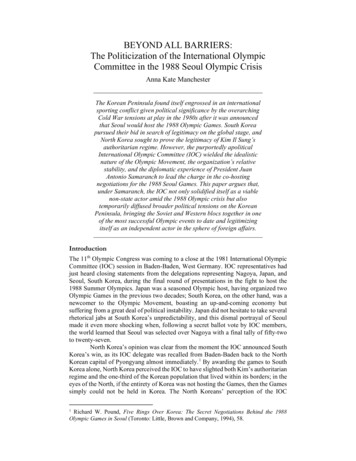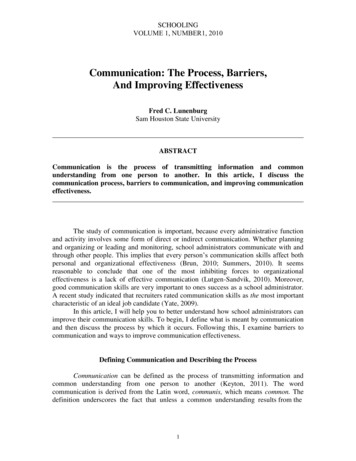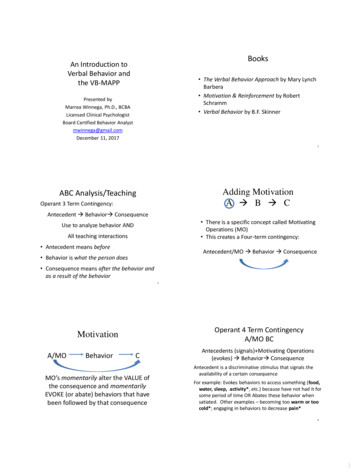
Transcription
BEYOND ALL BARRIERS:The Politicization of the International OlympicCommittee in the 1988 Seoul Olympic CrisisAnna Kate ManchesterThe Korean Peninsula found itself engrossed in an internationalsporting conflict given political significance by the overarchingCold War tensions at play in the 1980s after it was announcedthat Seoul would host the 1988 Olympic Games. South Koreapursued their bid in search of legitimacy on the global stage, andNorth Korea sought to prove the legitimacy of Kim Il Sung’sauthoritarian regime. However, the purportedly apoliticalInternational Olympic Committee (IOC) wielded the idealisticnature of the Olympic Movement, the organization’s relativestability, and the diplomatic experience of President JuanAntonio Samaranch to lead the charge in the co-hostingnegotiations for the 1988 Seoul Games. This paper argues that,under Samaranch, the IOC not only solidified itself as a viablenon-state actor amid the 1988 Olympic crisis but alsotemporarily diffused broader political tensions on the KoreanPeninsula, bringing the Soviet and Western blocs together in oneof the most successful Olympic events to date and legitimizingitself as an independent actor in the sphere of foreign affairs.IntroductionThe 11th Olympic Congress was coming to a close at the 1981 International OlympicCommittee (IOC) session in Baden-Baden, West Germany. IOC representatives hadjust heard closing statements from the delegations representing Nagoya, Japan, andSeoul, South Korea, during the final round of presentations in the fight to host the1988 Summer Olympics. Japan was a seasoned Olympic host, having organized twoOlympic Games in the previous two decades; South Korea, on the other hand, was anewcomer to the Olympic Movement, boasting an up-and-coming economy butsuffering from a great deal of political instability. Japan did not hesitate to take severalrhetorical jabs at South Korea’s unpredictability, and this dismal portrayal of Seoulmade it even more shocking when, following a secret ballot vote by IOC members,the world learned that Seoul was selected over Nagoya with a final tally of fifty-twoto twenty-seven.North Korea’s opinion was clear from the moment the IOC announced SouthKorea’s win, as its IOC delegate was recalled from Baden-Baden back to the NorthKorean capital of Pyongyang almost immediately. 1 By awarding the games to SouthKorea alone, North Korea perceived the IOC to have slighted both Kim’s authoritarianregime and the one-third of the Korean population that lived within its borders; in theeyes of the North, if the entirety of Korea was not hosting the Games, then the Gamessimply could not be held in Korea. The North Koreans’ perception of the IOCRichard W. Pound, Five Rings Over Korea: The Secret Negotiations Behind the 1988Olympic Games in Seoul (Toronto: Little, Brown and Company, 1994), 58.1
THE CRIMSON HISTORICAL REVIEWdisrespecting their legitimacy on the international stage set the tone for a sportingproxy war on the Korean Peninsula that would ultimately disrupt larger Cold Wartensions, thereby necessitating the mediation of the IOC.South Korea pursued a bid for the 1988 Seoul Olympics in search oflegitimacy on the global stage, and North Korea sought to derail South Korea’ssuccess to prove the legitimacy of Kim Il Sung’s authoritarian regime, first by aimingto have the Games moved from Seoul and then by demanding to co-host with theSouth as a symbol of Korean unity. However, with political tensions so deeplyengrained into the agendas of both the North and South Korean delegations in the cohosting negotiations leading up to the 1988 Summer Olympics, it was the IOC thatwas able to drive the dialogue on the Seoul Games while also igniting broaderdiscussions about Korean reunification. The crucial role played by the IOC in thesecret negotiations begs the question of how an independent non-state actor with littlemeans to enforce its aims was able to successfully involve itself in a global sportingcrisis-turned-proxy war and emerge more legitimized than any other party involved.The previously apolitical IOC was able to wield the idealistic nature of the OlympicMovement, the organization’s relative stability, and the diplomatic experience ofPresident Juan Antonio Samaranch to lead the co-hosting negotiations for the 1988Seoul Games. Under Samaranch, the IOC not only gained public recognition as havingsuccessfully resolved the 1988 Olympic crisis but also diffused broader politicaltensions on the Korean Peninsula, bringing the Soviet and Western blocs together inone of the most successful Olympic events to date and legitimizing itself as anindependent actor in the sphere of foreign affairs.American Olympian Eric Heiden famously stated that “sports and politicsdon’t mix” in reference to President Jimmy Carter’s decision to boycott the 1980Moscow Games. 2 As much as sporting organizations like the IOC might like tobelieve that they are several times removed from global politics, in an increasinglyglobalized world, this notion could not be farther from the truth. The rise of sportsliterature is challenging traditional conceptions of international relations as a statecentered discipline. 3 Global sporting competitions are increasingly used as soft powermechanisms, which has heightened the study of sport diplomacy. There has been asimilar growth in the body of scholarship focusing on the role of non-state actors ininternational affairs; however, with sports literature centering more on the impact offans, digital media, and corporations, there is a current lack of knowledge regardinghow international non-governmental organizations (INGOs) function as politicalactors in the global sporting arena. 4 To accurately present the personal motivations ofeach party involved in the negotiations and to better understand the political situationsurrounding the 1988 Seoul Games, this article relies on public statements of foreignleaders, personal correspondences between President Samaranch and members of theinternational community, meeting minutes from the negotiations, and media reports.With the credibility offered by the preponderance of both primary and secondarysource analysis, this paper seeks to establish the 1988 Olympic crisis as a test case forhow a non-political INGO such as the IOC was able to influence an issue as politicallycontentious as inter-Korean relations. Additionally, with little existing literaturediscussing the Seoul Games in general, this piece also aims to fill a current gap inThomas Gift and Andrew Miner, “‘Dropping the Ball’: The Understudied Nexus of Sportsand Politics,” World Affairs 180, no. 1 (Spring 2017): 132, JSTOR.3Verity Postlethwaite and Jonathan Grix, “Beyond the Acronyms: Sport Diplomacy and theClassification of the International Olympic Committee,” Diplomacy and Statecraft 27, no. 2(2016): 296, Taylor & Francis Online.4Postlethwaite and Grix, “Beyond the Acronyms,” 299.218
BEYOND ALL BARRIERSsports literature by presenting the story of the 1988 Olympic negotiations as somewhatof an historical narrative focusing on the stories of the specific individuals involved.All this being said, by increasing its diplomatic legitimacy to sit on par with that ofthe involved state actors, the IOC’s role in the secret negotiations points to theimportance of non-state actors in the resolution of crises in an interdependent worldorder.Historical ContextThe KOREAN CONFLICT and its RESIDUAL EFFECTSIt is best to refer to the end of the Second World War to gain an understanding of thespecific Cold War tensions underpinning the 1988 Olympic crisis. The United Statesand the Soviet Union agreed to divide Korea at the 38th parallel to restabilize thecountry in what the West thought would be a temporary arrangement; however,reunification was not so easily resolved. 5 The mostly ideological conflict turnedphysical when the North, with the Soviet Union’s support, invaded the South in Juneof 1950. The United Nations, relying mostly on the military strength of the UnitedStates, joined in the fight on the side of the South Koreans and, after over 4 millioncasualties were incurred on both sides of the 38th parallel, the fighting came to a closein July of 1953. 6 Negotiations in the year following the armistice proved fruitless forthose hoping to see a reunited Korea, and there has been both a cultural and physicaldivide between the North and South ever since.The Korean people suffered not only massive loss of life but also ruinouseconomic devastation in the aftermath of the Korean War. North Korea reported theloss of over 600,000 residences, roughly 8,700 manufacturing plants, and almost onemillion acres of farmland. 7 North Korean leader Kim Il Sung, known for his tendencyto sugarcoat the sufferings of his people, simply stated that his “people’s economy[had] been totally destroyed by the war.” 8 TheSouth Korean economy fared nobetter, losing almost twice as many industrial facilities and suffering property damagevalued at over 2 billion; however, Western aid and a desire to internationalizeallowed South Korea to slowly recuperate from their economic losses in a way thatNorth Korea’s isolationist tendencies prevented. 9 The successful recovery of theSouth Korean economy by the 1980s and its emergence as a regional economicsuperpower made it possible for Seoul to compete to host the 1988 Summer Olympicsand, in a similar vein, it was the continued suffering of the North Korean economythat made co-hosting so appealing.The plight of North Koreans after the war motivated Kim Il Sung to pursuethe ideological indoctrination of his citizens in an effort to maintain control over hisstate. 10 The United States had become his foremost enemy due to their involvementin the Korean conflict, a reputation that was propagated by North Korea’s insistencethat the United States had actually caused the war; Kim repeatedly claimed in thedecades after the Korean War that he was prepared to destroy the United States so asto protect his state, and engaging in negotiations disruptive to the 1988 Games wasyet another metaphorical battlefield on which Kim could face off against South Koreaand its ally, the United States. This continual perpetuation of lies about the culpability“Korean War,” Encyclopedia Britannica.B.C. Koh, “The War’s Impact on the Korean Peninsula,” The Journal of American-East AsianRelations 2, no. 1 (Spring 1993): 57, JSTOR.7Koh, “The War’s Impact,” 59.8Koh, “The War’s Impact,” 58.9Koh, “The War’s Impact,” 59.10Koh, “The War’s Impact,” 64.5619
THE CRIMSON HISTORICAL REVIEWof the United States in the Korean War and Kim’s repeated denial of responsibilityfor the atrocities that ensued was one of many factors that contributed to theweakening of North Korea’s trustworthiness in the eyes of the South which, in turn,affected the attitudes with which the two parties entered negotiations. The possibilityof Korean reunification was bleak well in the 1980s as a result of this mutual distrustand, with the judgement of both Korean delegations clouded by disdain, the Olympicnegotiations would necessitate an impartial mediator who could resolve the sportingcrisis against the backdrop of decades-long tensions.The CONVERGENCE of COLD WAR TENSIONSBoth state and non-state actors derive their legitimacy from other political actors.States like the two Koreas are able to exhibit their power via economic success ormilitary strength; however, non-state actors like the IOC rely on the recognition oftheir status by other actors in order to be perceived as influential and salient. 11 Withthe 1988 Olympic crisis serving as a microcosm of the broader Western and Soviettensions at play during the latter half of the 20th century, relations to the Cold War’ssuperpowers both guided and restricted the actions of the state and non-state actorsinvolved in the co-hosting negotiations.South Korea feared that the larger ideological conflict between the SovietUnion and the United States regarding the two Koreas posed the most imminent threatto the 1988 Seoul Olympics. According to President Chun Doo-Hwan, “Without thesupport of [the USSR or the USA], North Korea can do absolutely nothing and if itwere to do something, that would be an act of self-destruction If North Koreaattacks, it will be destroyed.” 12 The South had the support of the United States whodesired a peaceful Seoul Games. American Senator Ted Stevens, in a 1988 letter toSamaranch, implored the IOC not to use Seoul as a way to propagate the its ownforeign policy but to instead use the Games as an opportunity to facilitate culturalexchange between the North and the South. 13 Stevens had been in consistentcommunication with Samaranch because his constituency in Anchorage was in searchof a Winter Olympic bid, but this explicit begging on Stevens’ behalf displayed notonly American support for South Korea but also increasing global recognition of theIOC’s political motivations. James Lilley, American ambassador to South Koreaduring the Games, suggested that Seoul was “much more stable than LA was in ‘84,”putting the full faith of the United States behind the Seoul Games and legitimizing theIOC’s efforts to create political stability both within South Korea and on the KoreanPeninsula as a whole. 14On the other side of the Cold War conflict, the Soviet Union had the mostestablished relations with the North Koreans during the 1988 Olympic crisis due toSteven Ward, Status and the Challenge of Rising Powers (Cambridge: Cambridge UniversityPress, 2017): 35.12Sergey Radchenko, “It’s Not Enough to Win: The Seoul Olympics and the Roots of NorthKorea’s Isolation,” The International Journal of the History of Sport 29, no. 9 (June 2012):1251, Taylor & Francis Online.13Ted Stevens, “Letter from US Senator to the President of the International OlympicCommittee on Reagan and Gorbachev’s Support of De-politicizing 1988 Seoul Olympics,”July 5, 1988, History and Public Policy Program Digital Archive, International OlympicCommittee Archives (Switzerland). Obtained for NKIDP by Sergey Radchenko, Wilson CenterDigital Archive.14Mark McDonald,” Seoul’s Show Ready for World Stage,” The Dallas Morning News,September 11, 1988: 2K. NewsBank.1120
BEYOND ALL BARRIERStheir ideological similarities and military alliances. However, these sharedunderstandings were not strong enough for the Soviet Union to be willing to engagein another proxy war on North Korea’s behalf. The Soviets had long provided theNorth with its nuclear missiles and, with violent outbreaks in and around the Koreanpeninsula expected to occur prior to the Games to destabilize the region and deterstates from attending, the Soviet Union publicly assured the world that they would doeverything in their power to ensure a successful Olympic event. 15 Gorbachevsupported the North in a public address accusing the South Koreans and the UnitedStates of attempting to “slow down the process of unification,” but he privately“appreciated the patience of the IOC” in dealing with the absurdity of North Korea’sdemands. 16 The Soviets and the Americans realized that using the 1988 SeoulOlympics as yet another proxy war would serve more harm than good, which allowedthe IOC to prompt the Olympic negotiations and mediate Korean relations.The OLYMPIC GAMES as POLITICAL STAGEThe original Olympic Games enjoyed over twelve centuries of prestige in the ancientera. In 1894, Pierre de Coubertin established the International Olympic Committee inpreparation for the revival of the Olympic Games, with the first Olympic event of themodern era slated to occur in Athens, Greece, the birthplace of the OlympicMovement, in 1896. 17 The return of the Olympic Games was intended to serve as abreak from the political conflicts of the era, and the IOC was touted as possessing asense of “political neutrality” that would allow it to indiscriminately promote theconcept of Olympism around the world. 18 The Olympic Charter, established byCoubertin following the IOC’s inception, champions Olympism as: a philosophy of life, exalting and combining in a balanced whole the qualities ofbody, will, and mind. Blending sport with culture and education, Olympism seeks tocreate a way of life based on the joy of effort, the educational value of good example,social responsibility and respect for universal fundamental ethical principles. 19The Olympic Movement hoped that countries would be able to overcomepolitical strife for the sake of their athletes and for the benefits of cultural exchangeamongst global citizens. With the development of the IOC as the ultimate nonpartisaninternational sporting organization, Coubertin believed that the modern OlympicGames could transcend the decline in quality and the political entanglement that befellits ancient predecessor. 20Pound, Five Rings Over Korea, 297.; “Soviets, Chinese Vow to Help Keep Olympics TerrorFree,” The Dallas Morning News, July 17, 1988: 28A. NewsBank.16Mikhail Sergeyevich Gorbachev, “Statement by M.S. Gorbachev: ‘The Amelioration of theInternational Situation, Strengthening of Peace’,” November 11, 1986, History and PublicPolicy Program Digital Archive, Archive of the Gorbachev Foundation, Fond 5, opis 1,Dokument 20669. Obtained and translated for NKIDP by Sergey Radchenko, Wilson CenterDigital Archive.; Willi Daume, “Information Note on a Visit by Soviet Olympic CommitteePresident Gramow to Munich,” January 15, 1988, History and Public Policy Program DigitalArchive, International Olympic Committee Archives (Switzerland). Obtained for NKIDP bySergey Radchenko, Wilson Center Digital Archive.17Jean-Loup Chappelet and Brenda Kübler-Mabbott, The International Olympic Committeeand the Olympic System (New York: Routledge, 2008), 78; “Pierre de Coubertin: Visionaryand Founder of the Modern Olympics” International Olympic Committee.18International Olympic Committee, Olympic Charter, (Lausanne: Comité InternationalOlympique, 1908): 11.19IOC, Olympic Charter, 11.20History.com Editors, “The Olympic Games,” HISTORY, updated February 7, 2022.1521
THE CRIMSON HISTORICAL REVIEWThe Olympics were quickly employed by foreign states as platforms uponwhich they could promote their own policy aims. Adolf Hitler infamously used the1936 Berlin Games to propagate his new Reich. 21 The IOC was the first internationalorganization to cut all ties with South Africa due to their apartheid and, two yearslater, the 1972 Munich Games served as the execution site of eleven Israelis in theBlack September terrorist massacre. 22 The type of Cold War politicization that theSeoul Olympics suffered from emerged in 1980 with the US-led boycott of theMoscow Games. In response to the Soviet invasion of Afghanistan, Americanpresident Jimmy Carter announced that the United States would be boycotting the1980 Summer Olympics, and he convinced sixty-four other nations to join in protest. 23The Soviet Union attempted to return the favor at the 1984 Los Angeles Games, but“the world [was] tiring of Olympic boycotts,” and it was only able to convince thirteenof its satellites to follow suit. 24As the world became more interconnected on all fronts, it was inevitable thatgovernments would shift their perception of global sporting events as opportunities topromote “international goodwill” toward, instead, using competitions like theOlympics as soft power mechanisms to garner prestige. 25 While the ideological appealof Olympism persisted, the heightened politicization of the Olympic Games and, morespecifically, Olympic boycotts aimed at the “pursuit of broader diplomatic goals”required the IOC to assume a more active role on the global political stage in thenegotiations to resolve the 1988 Olympic crisis. 26The NegotiationsNorth Korea initially directed its efforts at promoting South Korea’s instability toderail the 1988 Games while protecting its own legitimacy as a sovereign state, butthe North’s transition toward desiring to co-host alongside Seoul necessitated theIOC’s mediation in talks between the two Koreas. The idea of North Korea co-hostingallegedly originated with Italian Foreign Minister Giulio Andreotti in June of 1984. 27However, it was brought to international attention following a 1985 interview ofCuban president Fidel Castro in which Castro wished to “avoid the catastrophe whichthe choice of Seoul alone implies.” 28 Castro possessed a great deal of influence bothwithin socialist circles and among non-aligned countries. With Kim’s fragileinternational standing, the backing of the Cuban government to the North’s desire tojointly host gave credence to North Korea’s new slant on the 1988 Seoul Olympics.Summarized in a report from IOC Vice President Ashwini Kumar following his 1985trip to Pyongyang, “North Korea now felt that if they boycotted [or disrupted] theGames they would perhaps earn the odium of the whole world and the best way toPound, Five Rings Over Korea, 19.Pound, Five Rings Over Korea, 25-27.23Pound, Five Rings Over Korea, 33.24Pound, Five Rings Over Korea, 33, 37.25Lincoln Allison and Terry Monnington, “Sport, prestige, and international relations,” in TheGlobal Politics of Sport: The Role of Global Institutions in Sport, ed. Lincoln Allison (NewYork: Routledge, 2005), 11.26Lincoln Allison, “Sport and globalization: The issues,” in The Global Politics of Sport: TheRole of Global Institutions in Sport, ed. Lincoln Allison (New York: Routledge, 2005), 11.27Radchenko, “It’s Not Enough to Win,” 1245.28Fidel Castro, “Interview with Fidel Castro,” interview by Mervyn Dymally, July 25, 1985;History and Public Policy Program Digital Archive, International Olympic CommitteeArchives (Switzerland). Obtained for NKIDP by Sergey Radchenko, Wilson Center DigitalArchive.212222
BEYOND ALL BARRIERSprove the other side wrong was to ask for a unified team.” 29In response to North Korea’s demands, the IOC determined that a meetingbetween the National Olympic Committees (NOCs) of the two Koreas under itssupervision was the best course of action. The IOC was not at all interested in allowingNorth Korea to co-host the 1988 Games but, by entangling the North in a series offormal negotiations, President Samaranch hoped to avoid any preemptive boycottsthat North Korea might organize and buy himself the time to increase acceptance ofSeoul as a host city. 30 The United States and the Soviet Union both experiencedfirsthand the devastation of hosting an Olympic event overshadowed by a politicalboycott, prompting their NOCs to sign an agreement in 1985 that would prevent futureboycotts orchestrated on the basis of Cold War hegemonic tensions. 31 With Castropublicly expressing his support of a Korean co-hosting situation, however, a boycottof non-aligned states presented a noticeable threat that the IOC hoped to quell byentertaining negotiations with North Korea. The awarding of the 1988 SummerOlympics to Seoul was “final and irrevocable,” but Samaranch recognized thatappearing to engage with North Korean demands would promote the image of anapolitical IOC and distance the organization from possible insult by Kim’s regime. 32By keeping the North in talks with the South, Samaranch hoped that Kim would haveno reason to disrupt an Olympic event that Pyongyang might come to co-host.The South Korean NOC knew they were not going to be expected to cedeOlympic events to the North; they were simply looking to prevent retaliation againstthe 1988 Games by regional superpowers who might back North Korea, namely theSoviet Union and China. 33 Having witnessed the impact of the 1980 and 1984boycotts, Seoul accepted the negotiations with North Korea as an opportunity toprevent their Olympics from suffering a similar fate. Most perceived the North’sdemands to be authentic, but IOC Vice President Richard Pound theorized that NorthKorea was hoping to create an unresolvable situation that would allow them to placeculpability for the failed negotiations on the IOC and the South. 34 Aside from beingable to blame the other parties, North Korea also benefitted from the IOC’s exhaustionof boycotts. 35 While the IOC and South Korea possessed a shared understanding thatNorth Korea would not serve as a 1988 co-host, the threats posed to the Seoul Gamesby North Korea’s network necessitated negotiations between the two Koreas in anenvironment that would allow Samaranch to slyly influence the evolution of NorthSouth tensions to minimize their impact on the success of the Seoul Olympics.The IOC hosted the NOCs at its headquarters in Lausanne, Switzerland, onthree occasions between October 1985 and June 1986 in attempts to promote thestability and success of the 1988 Seoul Games. The North Korean NOC initiallydemanded to host half of Seoul’s twenty-three Olympic sports in Pyongyang. The IOCand South Korea presented several counteroffers, each consisting of a few small-scaleAshwini Kumar, “Report by International Olympic Committee Vice President on his Tripto North Korea,” July 16, 1985, History and Public Policy Digital Archive, InternationalOlympic Committee Archives (Switzerland).Obtained for NKIDP by Sergey Radchenko, Wilson Center Digital Archive.30Pound, Five Rings Over Korea, 84.31“North Korea warns of boycott in 1988,” Daily Breeze (Torrance, CA), October 9, 1985:D3. NewsBank.32“North Korean Warns of Boycott in 1988.”33Radchenko, “It’s Not Enough to Win,” 1244.34Pound, Five Rings Over Korea, 78.35Pound, Five Rings Over Korea, 78.2923
THE CRIMSON HISTORICAL REVIEWdisciplines like table tennis and wrestling in conjunction with individual events, suchas hosting one of four preliminary soccer rounds. 36 Over the course of the first threemeetings, the North proved unwilling to accept less than eight full sporting events tobe hosted on North Korean territory, especially after Soviet leader Mikhail Gorbachevpublicly stated that, as a matter of “arithmetic,” the North should co-host one-third ofthe 1988 Olympics in proportion to their hosting one-third of the Korean population.37No matter how many Olympic events the South offered to the North, the North KoreanNOC remained unwilling to compromise unless their specific demands were met,suggesting that it was Kim Il Sung’s intention to create a deadlock in order to blamethe IOC for favoring the South during the negotiations and, in turn, advocating for theSouth’s primacy on the Korean peninsula.Prior to the first meeting, IOC Vice President Ashwini Kumar traveled toPyongyang to meet with North Korean sports officials to investigate the current stateof inter-Korean tensions and their potential effects on the Seoul Games. Kumar, in hisletter back to Lausanne, advised Samaranch not to rush the negotiations due to theirentanglement with larger political issues. In the words of Kumar, “Talks are going onother subjects where there are differences between the two countries and if they cometo a decision on those subjects, I have no doubt that they will come to a fruitfuldecision on the sports front also.” 38 North Korean officials did not speak on thelogistics of co-hosting, but they promised Kumar that, if granted the opportunity toco-host, they would provide “much better facilities than the archaic ones” providedby Los Angeles. 39 The IOC returned a year later to check on Pyongyang’spreparations. The infrastructural development occurring in the North impressed theIOC; Pyongyang was in the process of constructing four stadiums, nine gyms and ahealth complex, as well as media facilities and three hotels. 40 The costly investmentsmade by the North Koreans created the appearance of their commitment to co-hosting,but this physical preparation was incongruent with the development of the North’sargument as the IOC negotiations progressed.The negotiations had resulted in few conclusions by the time the thirdLausanne meeting had occurred, and it was at this point that both the IOC and theSouth Koreans were beginning to realize the absurdity and inflexibility of the North’sdemands. The meetings focused on logistical issues that would have to be resolved inorder for Pyongyang to co-host, such as the opening of the border along the 38thparallel to the Olympic family and foreign media; however, the North Koreandelegation preferred to talk about more trivial issues, such as whether cycling raceswould start or end in Pyongyang. 41 It became evident that the North’s “position wasmoving from the unrealistic to the surreal” when they convened a fourth and finalmeeting just over two months before invitations were to be sent out and revisited theirinitial demands for half of the twenty-three sporting events. 42 While the years-longinter-Korean negotiations under the supervision of the IOC failed to come to anagreement, Samaranch recognized the necessity of maintaining control over thepolitical tensions at play in the 1988 Olympic crisis, both for the success of the SeoulPound, Five Rings Over Korea, 78.Gorbachev, “Statement by M.S. Gorbachev.”38Kumar, “Report.”39Kumar, “Report.”40James Miles, “North Koreans prepare to co-host 1988 Olympics Games,” HoustonChronicle, December 21, 1986: 24. NewsBank.41Pound, Five Rings Over Korea, 181, 216.42Pound, Five Rings Over Korea, 301.363724
BEYOND ALL BARRIERSOlympics and for the protection of his personal and institutional legitimacy.The Necessity of LegitimacySOUTH KOREASouth Korea sought to use the 1988 Summer Olympics as a form of “publicdiplomacy,” a soft power mechanism wherein the government of one state aims tomanipulate public opinion amongst citizens of a second state in order to coerce thesecond state’s government to bend to its will. 43 The southern half of the KoreanPeninsula had begun to emerge as a regional economic power by the 1980s, and it washoped that the Seoul Games would legitimize South Korea as a viable political actor,as well. This search for legitimacy prompted South Korean presidents Park Chunghee and Chun Doo-hwan to pursue an Olympic bid, but it also encouraged SouthKorea to agree to IOC-led negotiations with North Korea when doubts of S
Thomas Gift and Andrew Miner, "'Dropping the Ball': The Understudied Nexus of Sports and Politics," World Affairs . 180, no. 1 (Spring 2017): 132, JSTOR. 3. Verity Postlethwaite and Jonathan Grix, "Beyond the Acronyms: Sport Diplomacy and the Classification of the International Olympic Committee," Diplomacy and Statecraft . 27, no. 2










